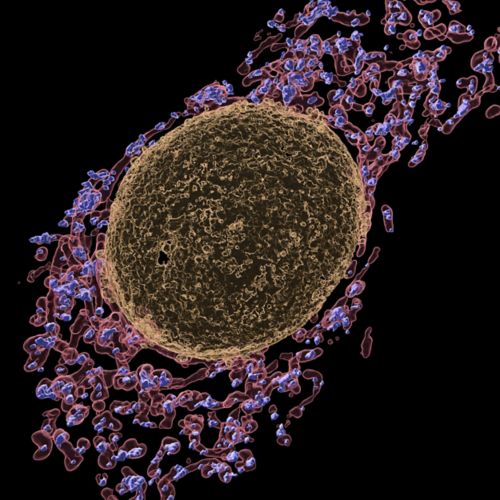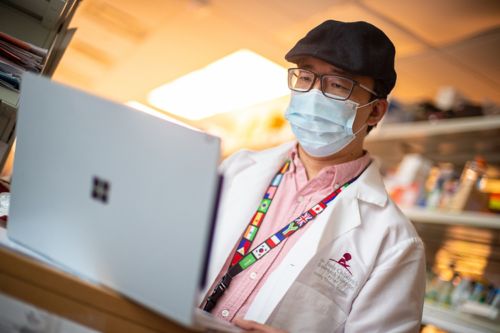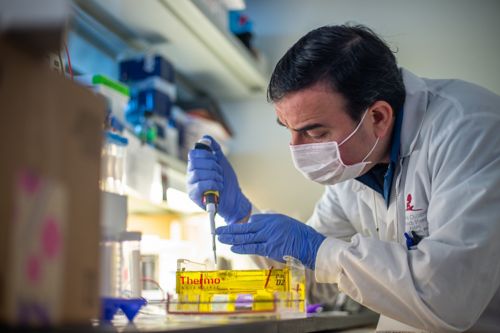St. Jude Family of Websites
Explore our cutting edge research, world-class patient care, career opportunities and more.
St. Jude Children's Research Hospital Home

- Fundraising
St. Jude Family of Websites
Explore our cutting edge research, world-class patient care, career opportunities and more.
St. Jude Children's Research Hospital Home

- Fundraising
Douglas Green Lab
Decoding the central mechanisms of cell death, survival, and the immune response
About the Green Lab
Our laboratory asks fundamental questions about the journey of cells – how do cells live and die, and how do these processes affect the body? Our work uses multiple -omics-based approaches as well as computational tools to try to answer these questions. We want to understand the molecular interactions and biochemistry of single cell survival, and to explore how immunology affects both health and disease in whole organisms. Our discoveries help create a better understanding of catastrophic diseases in children.

Our research summary
In our laboratory we investigate fundamental molecular processes involved in cell survival and death, and how these processes operate in other cellular contexts and disease states. Our research into cell death, noncanonical functions of survival pathways, and the cell biology of T lymphocytes encompasses a variety of technical approaches that include targeted and global metabolomics, proteomics, transcriptomics and diverse computational tools. Together we try to understand the complex world of how cells eat, live, and die.
Apoptosis and necroptosis
Our laboratory explores why some cells live and some die despite receiving similar signals, and how that pivotal decision can create lasting changes in a cell. We have studied this in the context of different forms of regulated cell death, such as apoptosis and regulated necrosis. Using a variety of molecular and cellular biology tools as well as computational methods, we have discovered ways in which thresholds of the response to cellular injuries are set and how these act as determinants of cell death or survival. We have found that the engagement of cell death pathways can trigger molecular responses that affect the behavior of the cell as well as other cells in its vicinity. In the context of cancer therapy, inducing the immune response or triggering apoptosis may stimulate pathways that drive mutations and augment invasiveness and metastasis in the cells that survive. Understanding this life and death decision and its consequences is highly relevant to the treatment of cancer and other pathological conditions.
Our laboratory also explores the regulation of cell death by the cysteine protease caspase-8, originally described as an essential mediator of apoptosis in response to engagement of death receptors on the cell surface. We have discovered that caspase-8 has additional roles; caspase-8 inhibits a form of regulated necrosis called necroptosis, it engages a novel inflammasome and in doing so mediates pyroptosis, and it participates in inflammatory signaling irrespective of its roles in regulating cell death. Our observations show that the pathways of cell death are far more intertwined and intricately regulated than is currently being appreciated, having important implications for development, immune homeostasis, the outcome of infections and possibly cancer.

LAP and LANDO
Another area of investigation in our laboratory focuses on our discovery of a new molecular pathway that revolves around the self-survival mechanism called autophagy. In these studies, we are exploring the noncanonical functions of autophagy proteins in the processes of LC3-associated phagocytosis (LAP) and LC3-associated endocytosis (LANDO). Projects in our laboratory involve investigate the initiation of LAP and LANDO by protein-lipid interactions, the roles for these processes in anti-cancer immunity, and roles for LAP and LANDO in cardiovascular disease and Alzheimer’s disease, among others. Additional studies focus on the removal of mitochondria by autophagy (mitophagy) and how this process intersects other cellular processes.

T cell biology
The third major research focus in our laboratory explores the cell biology of the early activation and differentiation of T lymphocytes. We have a particular interest in exploring the c-Myc oncogene that is required for the metabolic reprogramming of activated T cells and their entry into the cell cycle. The level of c-Myc in dividing cells determines their fate, either becoming a robust effector cell that makes rapid immune responses or becoming a quiescent memory cell poised for secondary responses. We investigate metabolic contributions to this decision as well as how asymmetric division of a dividing T cell can influence the cell fate outcome. We employ multiple infection and tumor models as translational applications of our findings. This research encompasses studies of methionine in T cell activation and anti-tumor immunity, polyamines in T cell function, the localized translation of c-Myc and its role in promoting asymmetric division in CD8 T cells, and the role of SWI/SNF in this process and in cell fate determination.
Learn more
Selected Publications
Contact us
Douglas R. Green, PhD
Immunology
MS351, Room E7050
St. Jude Children’s Research Hospital

Memphis, TN, 38105-3678 USA GET DIRECTIONS

